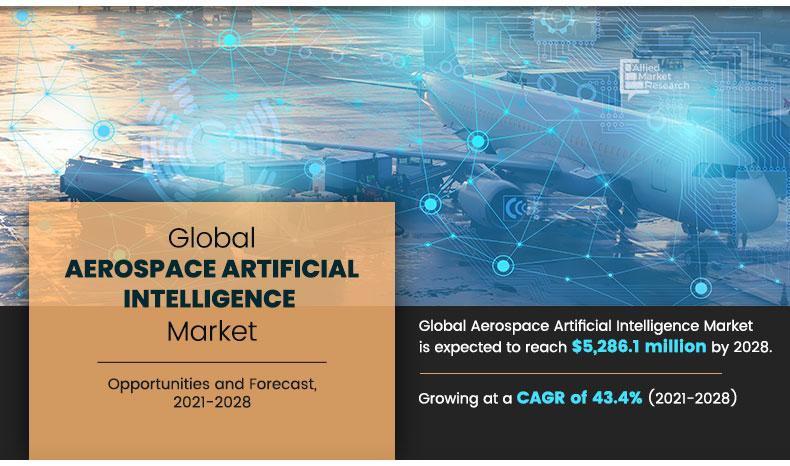According to a recent report published by Allied Market Research, titled, “aerospace artificial intelligence market by offering, technology, and application: global opportunity analysis and industry forecast, 2021–2028,” the global aerospace artificial intelligence market was valued at $373.6 million in 2020 and is projected to reach $5,826.1 million in 2028, registering a CAGR of 43.4%.
North America dominates the market, in terms of revenue, followed by Europe, Asia-Pacific, and LAMEA. U.S. dominated the global aerospace artificial intelligence market share in 2020, owing to the increase in R&D activities, technological developments by big players, and the rapid adoption of AI technologies in aerospace sector. Asia-Pacific region is expected to grow at a significant rate during the forecast period, owing to rise in the adoption of AI across various countries in the region. With implementation of AI, airlines would be able to better analyze customer demands to offer personalized services. In addition, airlines can also offer custom-made entertainment recommendations or other services by gathering and making use of data from on-board entertainment systems or personal devices. Other benefits of implementing AI include highly accurate, instantaneous weather conditions and information about turbulence to lessen missed connections and delays. Launch of various AI-powered solutions by big players such as Boeing, Airbus, IBM, and Microsoft, increasing partnerships among different AI firms, and rising investments for implementation of AI are promising for the aerospace sector as they are expected to offer new revenue streams to aerospace companies and create and transform air operations.
𝐑𝐞𝐪𝐮𝐞𝐬𝐭 𝐒𝐚𝐦𝐩𝐥𝐞 𝐏𝐚𝐠𝐞𝐬- https://www.alliedmarketresearch.com/request-sample/11702
By offering, the market is categorized into software, hardware, and services. The software segment accounted for the highest revenue in 2020, owing to high demand for different AI-powered software used across various aerospace applications such as smart maintenance, manufacturing, training, and flight operations, among others, by aerospace agencies globally. AI-based services offer convenience for enterprises to easily adopt AI across several operation domains. The rising popularity of AI services is expected to grow in the future.
By technology, the aerospace artificial intelligence market is segregated into machine learning, natural language processing, computer vision, and context awareness computing. The machine learning segment dominated the market in 2020, owing to high demand for machine learning based models utilized for several purposes such as predictive maintenance, air traffic control, and others.
Increase in fuel efficiency by use of artificial intelligence (AI) and rise in use of AI to ensure safety at airports are expected to drive the global aerospace artificial intelligence market growth during the forecast period. However, stringent airline regulations and high cost of adoption of AI in aerospace is anticipated to hamper growth of the market during the forecast period. Moreover, use of AI to ensure operational efficiency and maintenance of airplanes is expected to offer growth opportunities for the market in the future.
𝐏𝐫𝐨𝐜𝐮𝐫𝐞 𝐂𝐨𝐦𝐩𝐥𝐞𝐭𝐞 𝐑𝐞𝐬𝐞𝐚𝐫𝐜𝐡 𝐑𝐞𝐩𝐨𝐫𝐭- https://www.alliedmarketresearch.com/aerospace-artificial-intelligence-market/purchase-options

COVID-19 Impact Analysis
- The COVID impact on the aerospace artificial intelligence (AI) market is unpredictable and is expected to remain in force till the second quarter of 2021.
- The COVID-19 outbreak forced governments across the globe to implement strict lockdowns and banned domestic and international travel for most of the year 2020. This led to sudden fall in demand for air-travel and hampered adoption of artificial technology for aerospace applications across the globe.
- Moreover, nationwide lockdowns forced aerospace and AI related parts manufacturing facilities to partially or completely shut their operations.
- Adverse impacts of the COVID-19 pandemic have resulted in delays in activities and initiatives regarding development of robust and innovative aerospace artificial intelligence solutions globally.
𝐈𝐧𝐪𝐮𝐢𝐫𝐲 𝐁𝐞𝐟𝐨𝐫𝐞 𝐁𝐮𝐲𝐢𝐧𝐠- https://www.alliedmarketresearch.com/purchase-enquiry/11702
Key Findings Of The Study
- By offering, the software segment is expected to register a significant growth during the forecast period.
- By technology, the machine learning segment is anticipated to exhibit significant growth in the near future.
- By application, the flight operations segment is projected to lead the global aerospace artificial intelligence market owing to higher CAGR as compared to smart maintenance and training segments.
- By region, Asia-Pacific is anticipated to register the highest CAGR during the forecast period.
Key players operating in the global aerospace artificial intelligence market include Airbus S.A.S., General Electric Company, Intel Corporation, International Business Machines Corporation (IBM), Iris Automation Inc., Microsoft Corporation, SITA, Spark Cognition, Thales Groups, and The Boeing Company.